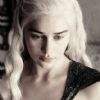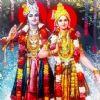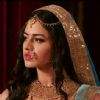Panchaali, do excuse my delay in replying, which was caused by some other preoccupations. At the outset, I must compliment you on a very well-written piece, boldly presenting an original 'minority' opinion on Duryodhana, Mb's great 'anti-hero'. Indeed, if valour in battle and a total absence of cowardice are taken (as they should be taken) as the hallmark of a true hero, D certainly is a great hero. In some ways, he resembles Ravana -- the antihero of India's other great epic -- in that both are fearless warriors and both are staunch devotees of Lord Shiva. Interestingly, this feature of eminently strong and heroic anti-heroes is unique to the Indian traditions. You do not, if one may say so, find equally strong and worthy antagonists elsewhere -- not in the Sumerian Epic of Gilgamesh, nor in the two great Homeric epics. Interestingly again, even the deemed 'badness' of the demoniac (
aasuri) connection [as rightly alluded to by Sayanee in her comments on your piece], which is common between the two, is a matter of perspective. The ancient Iranians worshipped the Asuras (
ahura, as they called them), and the primordial swapping of divinity between the Avestan Asuras and the Vedic Devas is a historical truth. This truth is also recorded in the Amarakosha, which cites
poorvadeva, i.e. 'gods of the past' as another synonym of 'Asura' [Incidentally, this aspect of swap between gods and demons is dealt with in more detail in a book I am writing now.]
Now, reverting to the subject of Duryodhana, he in a sense is one of the most 'human' characters in the Mb's star cast, given the earthly admixture of virtues and vices in him. Gods and demons, after all, are in the minds of man, and D was no exception. His virtues were his fairness to his subjects and a natural empathy towards the downtrodden. Like the single failing of the hero of a Greek tragedy, Duryodhana was done in by his one tragic flaw of envious greed. In the Sabha-Parva, he himself admits to Vidura his helplessness against his destiny: 'The One who controls the foetus in a mother's womb is my controller; I am being driven inexorably under His direction'. In the Udyoga-Parva he dismisses the wise counsel of the sage Kanva by slapping his hip: 'Maharshi, why waste your time on me? I conduct myself the way God has made me and in accordance with my destiny'. But for all that, one can discern several redeeming features in him. In the Drona-Parva, he addresses his friend-turned-foe Satyaki with the words: 'My friend, fie upon anger, greed and Kshatriya valour; we, who were inseparable in our youth, are now out to kill each other. What good to us will all the wealth do, for which we now battle?' In his last forlorn battle in the Shalya-Parva, he himself chose Bheem as his worthy opponent with the mace, disdaining to take advantage of Yudhishthir's generous offer to choose any one of the five Pandavas for battle. And in the Ashramvaasika-Parva, the dead Duryodhana's subjects admitted to Dhrtarashtra that the Kuru prince had never ill-treated them.
I must also flag the very valid point raised by your Duryodhana, viz. the unfairness of the killing of Vikarna, the only voice of ringing disapproval against Draupadi's humiliation in the fateful dice-hall event. All in all, a very well presented point of view, done with logic, panache and a lot of empathy for the underdog.
P.S. I should also add one plausible reason that might have fuelled Duryodhana's tragic envy. It is not explicitly mentioned by Vyasa, but one could reasonably infer that Duryodhana was never reconciled with Kunti's story that the Pandavas were legitimate
kshetraja sons, under the then socially accepted practice of
niyoga or surrogate assignment done by the dead Pandu himself. Dhrtarashtra perhaps had the same doubt, but could not voice it, given the acceptance by Satyavati, Bheeshma and Vidura of Kunti's account. In any case, to Duryodhana, Yudhishthira was a 'pretender' to the throne. This, of course, is my own reading of Duryodhana's psychology, which to the best of my knowledge has not been mentioned elsewhere.
Edited by abhijitbasu - 10 years ago


















comment:
p_commentcount